- Home
- Gustave Aimard
Les chasseurs d'abeilles. English Page 11
Les chasseurs d'abeilles. English Read online
Page 11
CHAPTER XI.
THE RANCHO.
The road the two men had to travel together was tolerably long. DonEstevan would not have been sorry to shorten it by talking to DonFernando, particularly as the manner in which he had made acquaintancewith the latter, and the light in which he had shown himself, excitedthe curiosity of the former in the highest degree. Unfortunately,Don Fernando did not seem in the least inclined to keep up theconversation; and, in spite of all his efforts, the _major-domo_ foundhimself obliged to conform to his companion's state of mind, andimitate his taciturnity.
They had already left the village a long way behind them, and werecantering along the undulating banks of the Rio Bermejo, when theyheard, at a short distance in front of them, the sound of a horse atfull gallop. We say, they heard; for, shortly after leaving the grotto,the sun had finally disappeared below the horizon, and there had been asudden transition from the glorious light of day to thick darkness.
In Mexico, where there is no police, or, at all events, only a nominalone, every man is obliged to take care of himself. Two men, meeting ona road after nightfall, cannot accost each other without the greatestprecaution, nor approach each other until fully assured they havenothing to fear.
"Keep your distance!" shouted Don Fernando, as soon as he thought theperson approaching was within reach of his voice.
"And why so? You know you have nothing to fear from me," answeredsomebody; the sound caused by the horse's hoofs ceasing at the sametime, denoting that the rider had halted.
"I know that voice," said the Mexican.
"And the man, too, Senor Don Fernando, for it is not very long since wemet; I am El Zapote."
"Aha!" laughed Don Fernando; "Is it you, Tonillo? Come on, _muchacho_."
The latter rode up directly.
"What the devil are you doing on this road, at this hour of the night?"
"I am coming from a rendezvous, and returning to the pueblo."
"I fancy that rendezvous has been a slippery affair."
"You insult me, Don Fernando. I am an honourable man."
"I have no doubt of it. Moreover, your affairs are not mine; and I donot choose to be mixed up with them. Come, adieu, Tonillo."
"A moment if you please. Since I have been lucky enough to meet you,grant me five minutes: I was going to look for you."
"You! Is it a case like the last? I thought you had had enough of thatspeculation, which hardly succeeds with me."
"Here is the matter in two words, Don Fernando. After what happened theother day, I considered that I owed you my life, and, consequently,had not full liberty of action where you are concerned. But you know,senor, I am a _caballero_; and as an honest man can but stick to hisword, I resolved to see the person who had paid me to kill you, andreturn him the money. It was hard to disburse so large a sum; but I didnot hesitate. One may well say, a good action always brings its ownrecompense."
"You ought to know that better than anyone else," laughed Don Fernando.
"You laugh! Very well; judge for yourself. I sought this person, whosename it is needless to mention."
"So much the more so, as I know it already."
"You do? Very well, then. This morning a _caballero_, one of myfriends, gave me notice that the person in question also wished tospeak to me. All was working wonderfully. But guess my amazement when,just as I was going to refund the money and throw up my engagement,this personage announced to me that he had been reconciled to you, thatyou were the best friends, and begged me to keep the hundred piastresas an indemnification for the damage he had caused me."
"Was it this person, then, whom you went to meet tonight?"
"The same. I have only just left him."
"Very well: go on, _compadre_" (comrade).
"Well, _caballero_, since this affair has ended in a manner honourableto me, as I flatter myself, I am at liberty to follow my owninclinations, and am quite at your service, if you will do me thehonour to employ me."
"I will not say no; perhaps in a day or two I may find a use for yourservices."
"You will not repent having employed me, senor. You will be always sureto find me at--"
"Not a word on that subject," said Don Fernando, interrupting himsuddenly; "when the time comes, I shall find you."
"As you please, senor. Now permit me to take leave of you and thishonourable _caballero_, your friend."
"Adieu, Zapote. A happy journey."
The _lepero_ joyfully took to his road again.
"Senor," said Don Estevan, as soon as the latter had gone, "in a shorttime we shall reach the _rancho_ (farmhouse) I inhabit with my mother;it would glad me to offer you shelter for the night."
"Thanks for your courtesy, which I gratefully accept. Is the _rancho_far from Las Norias?"
"Hardly a league. Were it daylight, you would be able to see from hencethe tall walls of the _hacienda._ Permit me to be your guide on theroad to my poor dwelling."
The cavaliers then bent to the left, entering a broad path lined withaloes. Very soon the barking of several watchdogs, and two or threespecks of light which twinkled through the darkness, apprised themthat it would not be long before they reached the end of their tediousjourney. In fact, after riding some ten minutes longer, they foundthemselves in front of a house, small, but apparently comfortable,under the _zaguan_ (veranda) of which several persons, provided withtorches, seemed to be expecting their arrival.
They stopped before the porch, dismounted, gave their horses to a_peon_, who led them away, and entered the dwelling, Don Estevanpreceding his guest in order to do the honours of his house.
They found themselves in a chamber of good dimensions, furnished withsundry chairs, a few armchairs, and a massive table, on which thecloth was laid for several persons. The whitewashed walls of the roomwere adorned with prints, frightfully coloured, representing the fourseasons, the five quarters of the globe, &c.
A woman, no longer young, dressed with a certain degree of refinement,and whose features, although marked by age, still preserved traces ofgreat beauty, stood in the middle of the room.
"Mother," said Don Estevan, bowing respectfully before her, "permit meto present to you Don Fernando Carril, an honourable _caballero_, whoconsents to be our guest tonight."
"He is welcome," answered Dona Manuela, with a gracious smile; "thishouse and all that is in it is at his disposal."
"Many thanks, senora, for this kind reception."
At first sight of the stranger Dona Manuela had begun to tremble,and had scarcely repressed an exclamation of surprise. The sound ofhis voice struck her no less, and she cast a profoundly scrutinisinglook over him; but after a moment she shook her head gently, as ifmistrusting the thought which had arisen.
"Be seated, senor," she said, pointing to the table with greatcordiality; "the supper shall be served directly. Your long ride willhave sharpened your appetite, and will make the frugality of the viandsless distasteful."
In fact, the meal was frugal, consisting of beans with red pepper, beefdried in the sun, a fowl boiled in rice, rolls of maize, with _pulque_and _mezcal_ to drink With great pleasure Dona Manuela watched theviands disappear with which she loaded their plates. She encouragedthem by all the means in her power to satisfy their hunger.
When supper was over, they passed into an inner chamber, morecomfortably furnished, which appeared to be the reception room.
The conversation, which had naturally been rather languid at dinner,now, little by little, grew more animated, and soon reached, thanks tothe efforts of Dona Manuela, that tone of pleasant familiarity whichbanishes every constraint, and doubles the charms of familiar chat.
Don Fernando seemed to enter with all his heart into the desultoryconversation, which leaped without ceasing from one subject to another;listening with complacency to the long stories of Dona Manuela, andanswering with apparent rankness the questions she asked him.
"Are you a _costeno_" (an inhabitant of the sea border), "or a _tierrasa dentro_" (one of those who dwel
l inland), "_caballero?_" the gooddame suddenly asked her guest.
"By my faith, senora," replied he, laughing, "I confess I feel somedifficulty in replying."
"Why so, senor?"
"For the simple reason that I have no idea where I was born."
"But you are _hijo del pais_" (literally, a son of the country),--"aMexican, at all events?"
"Everything leads me to think so, senora; but I would not swear it."
"That is very singular. Does not your family reside in the province?"
A shadow crossed the face of Don Fernando. "No, senora," he replieddryly.
The mistress of the house perceived she had touched a tender chord, andhastened to turn the conversation.
"Of course you know Don Pedro de Luna?"
"Very little, senora; accident threw us together once. It is true thecircumstances were too singular for him to forget them easily; but itremains to be seen whether I ever set foot in his _hacienda._"
"You are wrong, _caballero_; Don Pedro is a _cristiano Viejo_" (an oldChristian, i.e. a descendant of the early conquerors), "who exerciseshospitality after the fashion of old times: nothing makes him happierthan to practise it."
"Most unfortunately, important affairs call me to some distance, and Ifear I shall have no time to stop at his _hacienda._"
"Forgive the question," said Don Estevan; "but have you really theintention of entering the prairie?"
"Why do you ask, _caballero?_"
"Because we are here on the extreme Indian frontier; and unless youretrace your steps, it is only towards the wilderness you can bendthem."
"Well, then, it is my intention to go into the desert."
Don Estevan made a gesture of surprise.
"Forgive my pertinacity," said he; "but without doubt you must beacquainted with the desert you intend to enter?"
"By your leave, senor, I am thoroughly acquainted with it."
"And knowing its dangers, dare you enter it alone?"
"I thought I had given you a proof today," said he, with an indefinablesmile, "that I dare many things."
"Yes, yes; I know your courage carries you on to rashness: but what youwould undertake is worse than temerity--it is madness!"
"Madness, senor! The word is too strong. Can a resolute man, well armedand mounted, have anything to fear from the Indians?"
"If you had nothing to do but defend yourself against Indians andwild beasts. I should be somewhat in your way of thinking, senor: adetermined white can make head against twenty redskins. But how willyou escape from the Tigercat?"
"From the Tigercat? Excuse me, _caballero_, but I do not understand youat all."
"I will soon explain, senor. The Tigercat is a white. This man, fromreasons unknown to all, has joined the Apaches, has become one of theirchiefs, and sworn implacable hatred to all men of his own colour."
"I have heard vaguely of the man you mention; but, after all, he is theonly one of his race among the Indians. Redoubtable as he may be, he isnot invulnerable, I suppose; and a brave man might kill him."
"Unfortunately you are mistaken, _caballero_; this man is not the onlyone of his race among the Indians; other bandits of his class are withhim."
"Yes," cried Dona Manuela; "his son among the rest, who, they say, isas fierce a bandit as his father."
"Mother, that is only a surmise. If you come to proof, nothing can beaffirmed against Stoneheart."
"Who is the man of whom you speak?"
"His son, as people say; but one cannot be sure of it."
"And you call this man Stoneheart?"
"Yes, senor. For my own part, I know several instances of hisgenerosity, which indicate, on the contrary, a heart in its rightplace, and an ardent spirit capable of noble deeds."
A slight blush overspread the face of Don Fernando.
"Let us return to the Tigercat," said he. "What have I to dread fromthis man?"
"Everything. Concealed in the prairie, like a hideous _zopilote_(vulture) on its point of rock, this wretch pounces upon the caravans,whatever their strength, and pillages them; he murders in cold bloodthe solitary travellers whom their evil destiny delivers into hishands: his nets are stretched with such cruel skill, that none mayescape him. Listen to me, _caballero_: give up this journey, or you area lost man."
"I thank you for your advice, which, I know, is prompted by theinterest you take in me; nevertheless, I cannot follow it. But it istoo late; allow me to retire. I observed a hammock under the _zaguan_,in which I could pass the night admirably."
"I will give orders to have my son's chamber prepared for you."
"I could not allow anyone to be disturbed on my account, senora; I aman old traveller. Moreover, the night is already far gone. I swear youwould disoblige me by forcing me to accept the chamber of Don Estevan."
"Do as you think proper, _caballero_. A guest is one sent from God;he ought to be master in the house he inhabits, as long as he choosesto honour it with his presence. May the Lord watch over your reposeand bless your slumbers! My son shall show you the _corral_ (outhouse)where your horse has been stabled, in case you should wish to departbefore the household is awake."
"Many thanks, once more, senorita. I hope to pay my respects to youbefore I go."
Having exchanged a few more compliments with his hostess, Don Fernandorose and left the room, accompanied by Don Estevan. The wish heexpressed, to sleep in a hammock under the _zaguan_, was not at allextraordinary, and perfectly in accordance with the customs of acountry where the nights, by their beauty and freshness, compensate theinhabitants for the overpowering heat of the day.
The American _ranchos_ all have a porch, formed by four, and often sixcolumns, outside the house, and which support an _azotea_ (flat roof).In the large space between these columns, which are placed on eitherside of the main entrance, hammocks are slung, in which the owners ofthe dwellings themselves often pass the night, preferring to sleepin the open air rather than endure the torrid heat which literallyconverts into a stove the interior of the houses.
Don Estevan led his guest to the _corral_, explained to him themechanism of the lock, asked if he could be of any further service,wished him good night, and retired into the house, leaving the dooropen, so that Don Fernando might enter if he thought fit.
Dona Manuela awaited her son's return in the apartment where he hadleft her. The old lady seemed restless.
"Well," she asked, immediately her son made his appearance, "what doyou think of this man, Estevan?"
"I, mother!" he answered, looking astonished; "What can I think of him?I saw him today for the first time."
The old senora shook her head impatiently.
"You have been side by side for many hours; such a long _tete-a-tete_should have given you an opportunity of studying and forming an opinionof him."
"That man, my dear mother, during the short time I have been withhim, has appeared under so many different aspects, that it has beenaltogether an impossibility, I will not say to form an opinion, buteven to gain a ray of light by means of which I could direct my studyof him. I believe his to be a strong nature, full of nerve, capable ofgood or evil, accordingly as he follows the impulse of his heart or thecalculations of his egotism. At San Lucar everyone seems to dread himinstinctively,--for nothing ostensible in his conduct justifies therepulsion he inspires; no one can say positively who he is: his life isan impenetrable mystery."
"Estevan," said his mother, placing her hand heavily on his arm,as if to lend force to the words she was about to utter, "a secretpresentiment warns me that the presence of this man in these partspresages great misfortune. I cannot explain why. The moment he entered,his features recalled a confused recollection of events that happenedlong ago. I saw in his face points of resemblance with that of aperson dead, alas! How long?" She sighed. "When he spoke, the toneof his voice sounded mournfully on my ear; for the voice completedthe likeness I had found in his face. Whoever this man may be, I amconvinced there is trouble, perhaps danger, in store for us. I am old,
my son; I have much experience; and, you know, one is seldom mistakenat my age. Presentiments come from God; we must have faith in them.Watch that man's doings as long as he remains here. I could wish youhad never brought him under our roof."
"What could I do, mother? Hospitality is a duty from which no oneshould shrink."
"I do not reproach you, Estevan; you have acted according to yourconscience."
"God grant that you delude yourself, mother! After all, whatever theman's intentions may be, if he seeks to injure us, as you suppose, wecan but countermine his machinations."
"No, Estevan; it is not exactly for ourselves I fear."
"For whom, then, mother?"
"Cannot you understand me?" said she, with, a mournful smile.
"_iVive Dios,_ mother! Let him beware. But no, it is impossible.Nevertheless, I will go to the _hacienda_ at daybreak, and put DonPedro on his guard."
"Do not say a word to them, Estevan; but watch over them like afaithful friend."
"Yes, mother, you are right," said Estevan, who had suddenly becomethoughtful. "I will surround Hermosa with a vigilant protection, sosecret that no one shall suspect it. I swear it, _ivive Dios!_ I woulda thousand times rather die under the most atrocious torture, than seeher exposed anew to dangers like those of the last few days. And now,mother, give me your blessing, and let me go."
"Go, my son; and God protect you!"
Don Estevan bent respectfully before his mother, and retired; butbefore seeking repose, he made a minute examination of the house, anddid not extinguish his lamp till after he had convinced himself thatall was in perfect order.
As soon as Don Estevan had left him, Don Fernando threw himself intothe hammock, and closed his eyes. The night was calm and beautiful; thestars studded the heavens with an infinite number of diamonds; the moonspread her silver rays over the landscape; at intervals, the prolongedbaying of the watchdogs mingled with the abrupter bark of the _coyotes_(prairie-wolves), whose sinister forms were often perceptible in thedistance, the transparency of the atmosphere permitting remote objectsto be easily distinguished.
All slept, or seemed to sleep.
Suddenly Don Fernando raised his head, and peered cautiously overthe edge of his hammock. Thoroughly convinced that silence reignedthroughout the house, he slipped to the ground; after carefullylistening, and prying into the darkness in all directions, he placed onhis head the accoutrements of his horse, and turned his steps towardsthe _corral_.
Opening the door noiselessly, he whistled gently. At the signal, thehorse raised his head, and walked up to his master, who was holding thedoor half open.
The latter caught him by the mane, caressed him playfully, and thensaddled and bridled him with the dexterity and speed only acquired byconstant habit. The task over, his master wrapped his hoofs in fourpieces of sheepskin, to deaden the sound of his steps, vaulted into thesaddle, and bending over the neck of the noble brute: "Santiago!" criedhe, "now is the time to prove your mettle."
The horse, as if he understood his master, dashed off into thedarkness, and took the direction of the river at the top of his speed.
Meanwhile the greatest silence pervaded the _rancho_, none of theinhabitants of which seemed to be aware of this sudden flight.

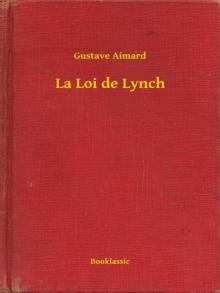 La loi de lynch. English
La loi de lynch. English The Guide of the Desert
The Guide of the Desert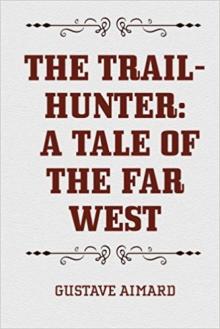 The Trail-Hunter: A Tale of the Far West
The Trail-Hunter: A Tale of the Far West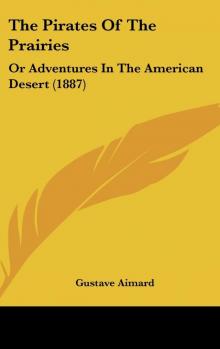 The Pirates of the Prairies: Adventures in the American Desert
The Pirates of the Prairies: Adventures in the American Desert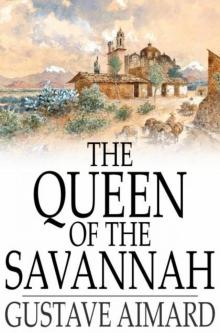 The Treasure of Pearls: A Romance of Adventures in California
The Treasure of Pearls: A Romance of Adventures in California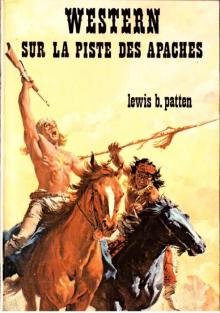 Les outlaws du Missouri. English
Les outlaws du Missouri. English Les trappeurs de l'Arkansas. English
Les trappeurs de l'Arkansas. English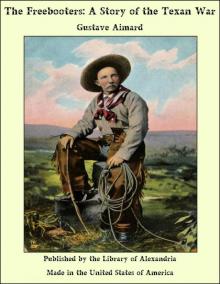 The Border Rifles: A Tale of the Texan War
The Border Rifles: A Tale of the Texan War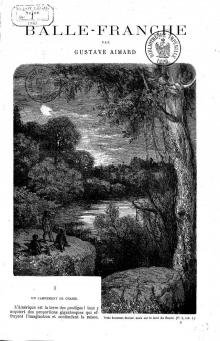 Balle-Franche. English
Balle-Franche. English The Queen of the Savannah: A Story of the Mexican War
The Queen of the Savannah: A Story of the Mexican War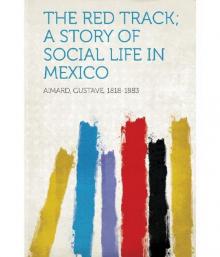 The Red Track: A Story of Social Life in Mexico
The Red Track: A Story of Social Life in Mexico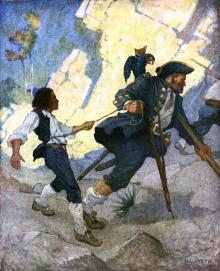 La fièvre d'or. English
La fièvre d'or. English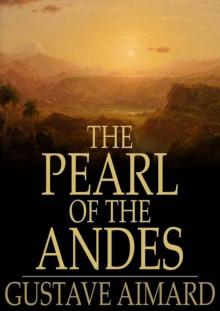 The Pearl of the Andes: A Tale of Love and Adventure
The Pearl of the Andes: A Tale of Love and Adventure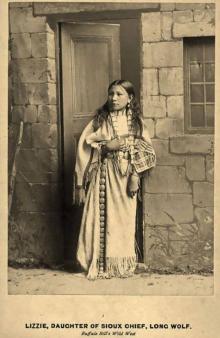 Les fils de la tortue. English
Les fils de la tortue. English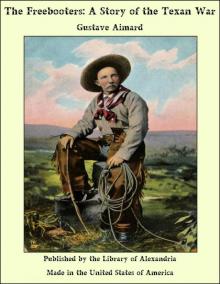 The Indian Chief: The Story of a Revolution
The Indian Chief: The Story of a Revolution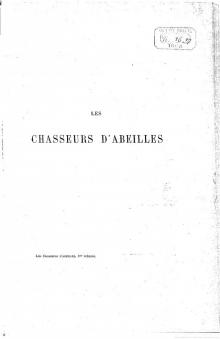 Les chasseurs d'abeilles. English
Les chasseurs d'abeilles. English The Adventurers
The Adventurers